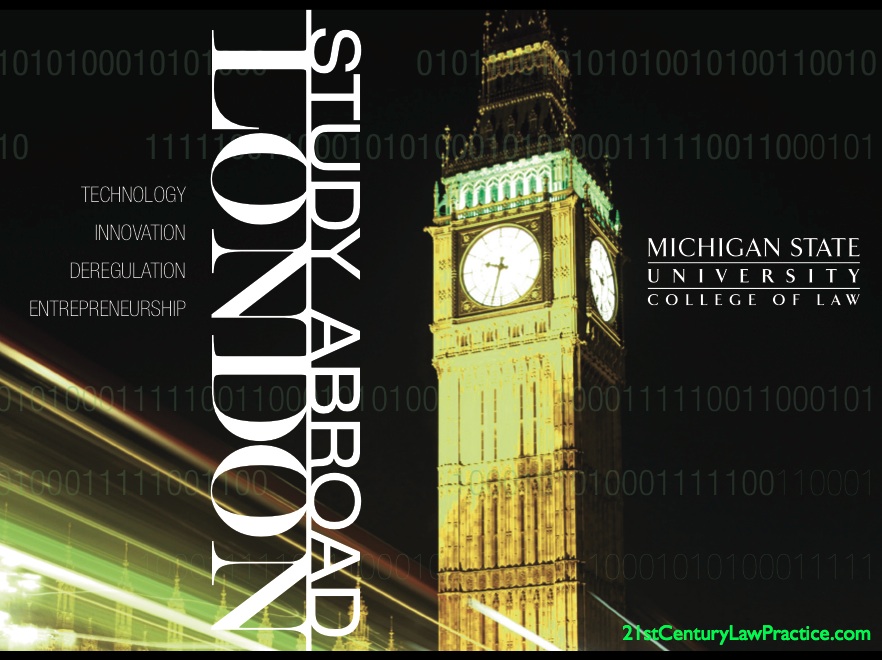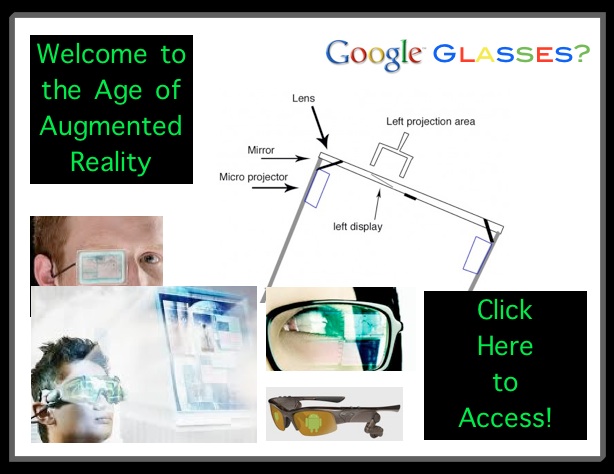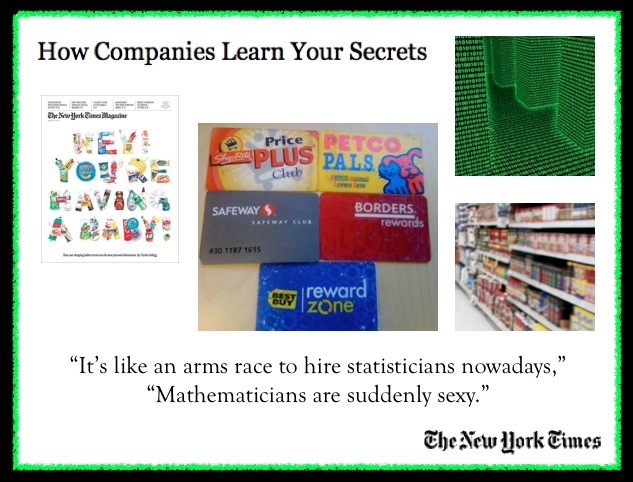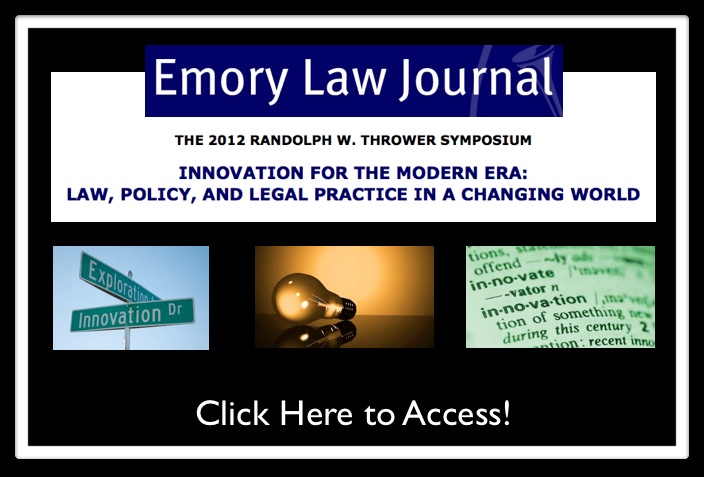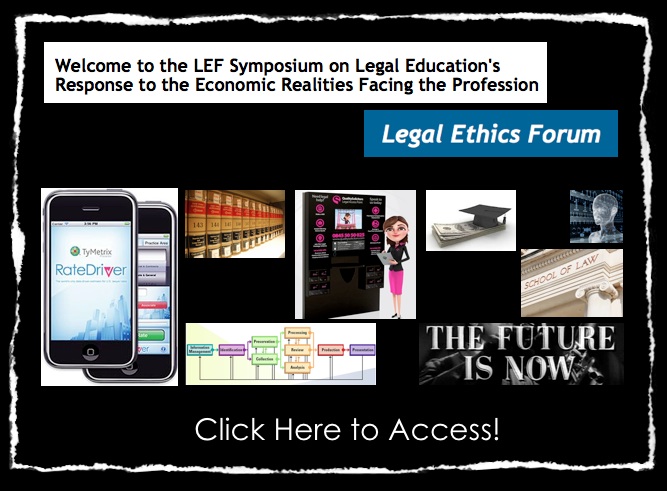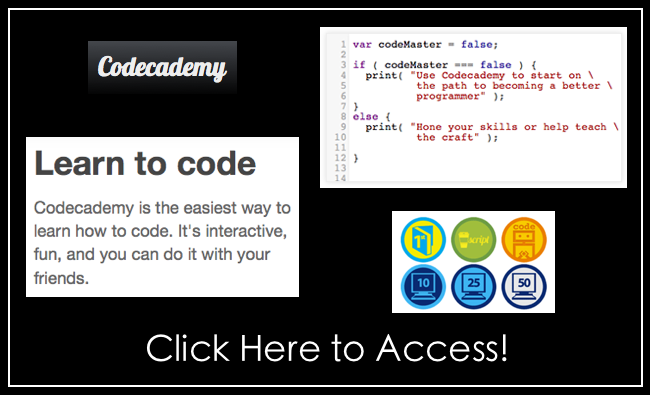Tag: the future
Technology, Innovation, Deregulation and Entrepreneurship – 21st Century Law Practice London Summer Program – Michigan State University College of Law — The Future is Today!
Program admissions are rolling and applications are due no later than March 25, 2012. Given that space in the program is limited, applicants are encouraged to submit their application as soon as possible. APPLY HERE!
If you know someone who might be interested in this exciting new program — please help us spread the word. Any student at an ABA Accredited law school is encouraged to apply.
For those who have already applied – please note we will be sending out the first round of acceptances to the program in the next few days.
Program Description:
“The MSU / Westminster 21st Century Law Practice London Summer Program is a first of its kind, intensive study of technology, innovation, regulation, entrepreneurship and the international legal marketplace. With the deregulation of lawyers in the United Kingdom and the outgrowth of alternative legal services delivery models, London is poised to become the global leader in the legal services market. Our program will educate students about these new delivery models and help prepare students for the technology infused law jobs of the 21st Century.”
Educational Objectives:
(1) Provide students a comprehensive understanding of the market for legal services as it transitions to a global legal supply chain in the wake of deregulation, economic pressures, and technological innovation.
(2) Prepare students to become practice-ready entrepreneurial lawyers who can leverage information technology in order to operate more efficiently and thereby attract (and retain) clients.
(3) Inspire students to think broadly about future delivery of legal representation and access to justice by exposing them to the innovative legal service delivery models and platforms of the present (and not-too-distant future).
Courses for the 2012 Program:
Legal Information Engineering & Technology – The increasing role of legal information technology in the law practice of today (and the not too distant future) will be highlighted in this course. Students will be exposed to a number of emerging approaches in legal automation, process engineering, informatics / ‘soft’ artificial intelligence (e-discovery, automated document generation), supply chain management, and quantitative legal prediction.
21st Century Law Practice – This course will provide students with an overview of the practice challenges facing lawyers in the 21st century, including economic pressures, technological advancements, increased globalization, international deregulation, and access to justice concerns (for example, reading the work of Richard Susskind, Thomas Morgan, and others). Building upon this background, the course will then explore a set of case studies to examine a variety of innovative new legal services delivery mechanisms and businesses in the US and the UK, such as Axiom, LawVest, Lawyers2You, LegalZoom, QualitySolicitors, Rocket Lawyer and others that have been created in anticipation of (or in some cases in response to) these practice challenges. Students will critically assess these legal service providers, and will reflect upon how lawyers and regulators should respond.
The Legal Services Act and UK Deregulation – Students will study the history and impact of the Legal Services Act and deregulation of the profession in the UK with a focus on how the resulting innovations (both regulatory changes and new legal services delivery mechanisms that follow) might be exported to the United States. Also encompassed in this course will be a comparative overview of American and British law governing lawyers and law practice, along with emphasis on globalization pressures faced by the legal profession.
Judge Peck’s Opinion on Computer Assisted Review (i.e. Predicitve Coding)
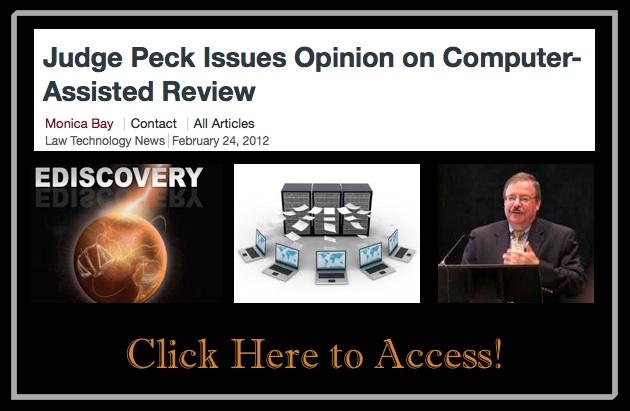 See also Monique Da Silva Moore, et al., Plaintiffs, v. Publicis Groupe & MSL Group, Defendents (Opinion and Order). as well as this article, this article, this article, this article, etc. from a few days ago (when there was a bit of misreporting on this case). [ HT: Legal Informatics Blog ]
See also Monique Da Silva Moore, et al., Plaintiffs, v. Publicis Groupe & MSL Group, Defendents (Opinion and Order). as well as this article, this article, this article, this article, etc. from a few days ago (when there was a bit of misreporting on this case). [ HT: Legal Informatics Blog ]
Health InfoScape [ via GE Data Visualization Lab ]
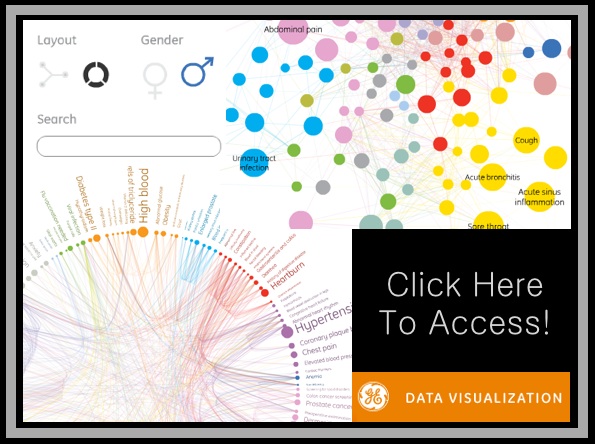 From the GE Page: “When you have heartburn, do you also feel nauseous? Or if you’re experiencing insomnia, do you tend to put on a few pounds, or more? By combing through 7.2 million of our electronic medical records, we have created a disease network to help illustrate relationships between various conditions and how common those connections are. Take a look by condition or condition category and gender to uncover interesting association.
From the GE Page: “When you have heartburn, do you also feel nauseous? Or if you’re experiencing insomnia, do you tend to put on a few pounds, or more? By combing through 7.2 million of our electronic medical records, we have created a disease network to help illustrate relationships between various conditions and how common those connections are. Take a look by condition or condition category and gender to uncover interesting association.
About the Data: “The information used for this visualization is based on 7.2 million patient records from GE’s proprietary database, and represents some of the conditions that commonly affect Americans today. By investigating how different ailments are related, one may gain various insights about condition associations. The numbers and percentages are meant to represent general trends. Looking at the data in new ways like this can help us understand health and gain new insights about how to take better care of ourselves and the healthcare system.”
The Age of Big Data [via NY Times]
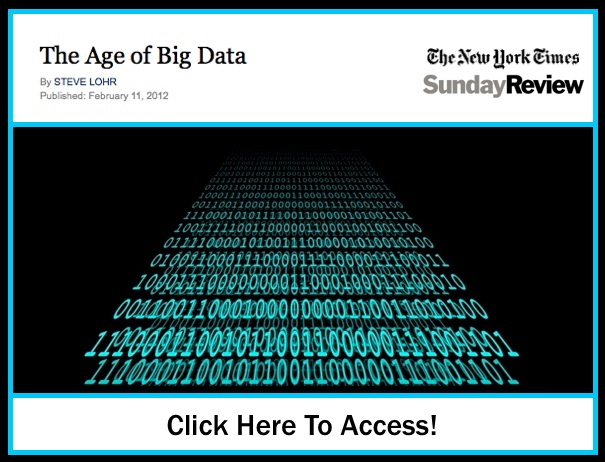 Please read this article and ask yourself how can we get in front of this – both as a profession and as an academy.
Please read this article and ask yourself how can we get in front of this – both as a profession and as an academy.
Big Data and ‘Soft’ Artificial Intelligence are the center piece of my presentation and forthcoming paper the Age of Quantitative Legal Prediction. For the legal services industry, a very different world is coming (is already here in certain circles). As a Law Professor, I am preparing my students to be the leaders in this world with my Quantitative Methods for Lawyers course, Legal Information Technology & Engineering (London Summer Program), E-Discovery as well as several other courses that my MSU colleagues and I are developing.
As I said to start the year – it is time to step up your game. 🙂
Legal Reasoning [ By Barbara Spellman & Frederick Schauer ]
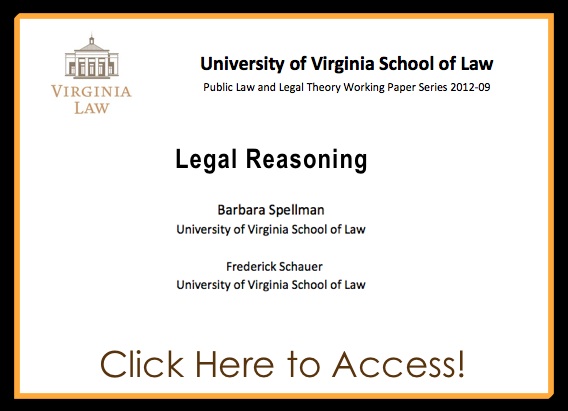 From the abstract: “The nature of legal reasoning, and its relationship with reasoning, has long been a topic of importance for lawyers and legal scholars. But it is also a topic with psychological implications, especially cognitive ones, and indeed most of the existing views about legal reasoning depend on psychological assumptions about the way in which ordinary people, lawyers, and judges reason and make decisions. This article, a chapter in the forthcoming Oxford Handbook on Thinking and Reasoning (K. Holyoak & R. Morrison eds.), explores the intersection between cognitive and social psychology, on the one hand, and legal reasoning and thinking and decision making, on the other. It attempts to show how existing psychological research is germane to the important questions about the nature legal reasoning – particularly with respect to precedent, analogy, authority, and rule-following – but even more it attempts to suggest a range of topics and questions that additions to the now-small body of psychological research might usefully address.”
From the abstract: “The nature of legal reasoning, and its relationship with reasoning, has long been a topic of importance for lawyers and legal scholars. But it is also a topic with psychological implications, especially cognitive ones, and indeed most of the existing views about legal reasoning depend on psychological assumptions about the way in which ordinary people, lawyers, and judges reason and make decisions. This article, a chapter in the forthcoming Oxford Handbook on Thinking and Reasoning (K. Holyoak & R. Morrison eds.), explores the intersection between cognitive and social psychology, on the one hand, and legal reasoning and thinking and decision making, on the other. It attempts to show how existing psychological research is germane to the important questions about the nature legal reasoning – particularly with respect to precedent, analogy, authority, and rule-following – but even more it attempts to suggest a range of topics and questions that additions to the now-small body of psychological research might usefully address.”
This is very useful paper. If anything, I believe the authors have understated the importance of these questions and this line of research – particularly in light of the broader dynamic of “human v. machine” which I have argued will come to dominate the future of the legal services industry (as well as other professional services). That does not mean that humans will be replaced writ large but there is some significant displacement coming down the pipeline — see here, here, here, here, here, etc.
Udacity – The Future of < Online > Education?
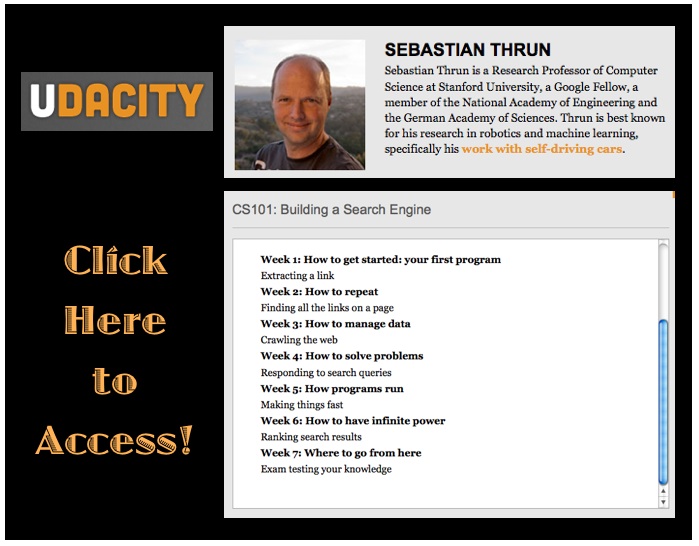 Sebastian Thrun of Stanford AI Class fame (you know – the largest class in human history with 160,000 participants) has just left his tenure track position to start an online education platform – Udacity. Here is an article about Udacity and here is the statement from the website: “We believe university-level education can be both high quality and low cost. Using the economics of the Internet, we’ve connected some of the greatest teachers to hundreds of thousands of students all over the world. ” In other words, the for-profits (i.e. University of Phoenix) as well as all of us at standard four year universities should be scared!
Sebastian Thrun of Stanford AI Class fame (you know – the largest class in human history with 160,000 participants) has just left his tenure track position to start an online education platform – Udacity. Here is an article about Udacity and here is the statement from the website: “We believe university-level education can be both high quality and low cost. Using the economics of the Internet, we’ve connected some of the greatest teachers to hundreds of thousands of students all over the world. ” In other words, the for-profits (i.e. University of Phoenix) as well as all of us at standard four year universities should be scared!
LegalTech 2012 NYC – The Power of Data, Prediction and Tectonic Changes in the Business of Law
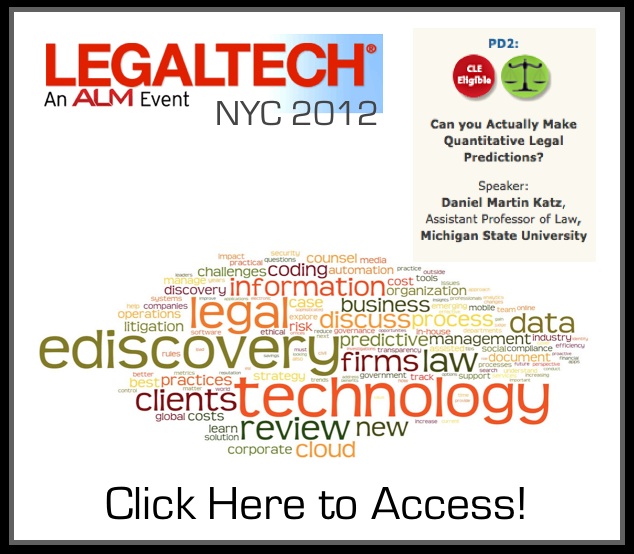 I am at the New York Hilton right now for Legal Tech NYC 2012. I am very pleased that I was asked to speak at this important conference.
I am at the New York Hilton right now for Legal Tech NYC 2012. I am very pleased that I was asked to speak at this important conference.
For those of you considering attending law school (particularly those with a technical prior background) please understand that although it may appear so on first glance – not all law schools are alike. At MSU Law, we are fully engaged in what is happening in the legal services industry. Things are changing very quickly and we are working to adapt rapidly to that change.
For example, we are in the process of proposing or rolling new courses including – Quantitative Methods for Lawyers (which focuses on quantitative thinking, technology and the business of law practice), E-Discovery, Entrepreneurial Lawyering as well as several others (to be announced).
In addition, we have just started our 21st Century Law Practice – London Summer Program which is “a first of its kind, intensive study of technology, innovation, deregulation, entrepreneurship and the international legal marketplace. With the deregulation of lawyers in the United Kingdom and the outgrowth of alternative legal services delivery models, London is poised to become the global leader in the legal services market. Our program will educate students about these new delivery models and help prepare students for the technology infused law jobs of the 21st Century.”
Anyway, I look forward to speaking tomorrow. If you are here for #LTNY please feel to drop in at the session — I will be speaking tomorrow about Quantitative Legal Prediction from 1:45pm – 3:00pm in The Power of Data section.

